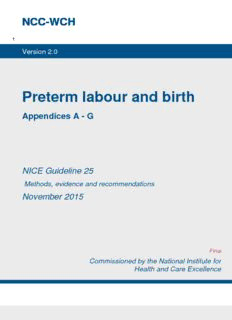Table Of ContentNCC-WCH
Version 2.0
Preterm labour and birth
Appendices A - G
NICE Guideline 25
Methods, evidence and recommendations
November 2015, updated June 2022
Final
Commissioned by the National Institute for
Health and care Excellence
PPTTLLBB -- AAppppeennddiicceess
Error! No text of specified style in document.
Disclaimer
The recommendations in this guideline represent the view of NICE, arrived at after careful
consideration of the evidence available. When exercising their judgement, professionals are
expected to take this guideline fully into account, alongside the individual needs, preferences
and values of their patients or service users. The recommendations in this guideline are not
mandatory and the guideline does not override the responsibility of healthcare professionals
to make decisions appropriate to the circumstances of the individual patient, in consultation
with the patient and/or their carer or guardian.
Local commissioners and/or providers have a responsibility to enable the guideline to be
applied when individual health professionals and their patients or service users wish to use it.
They should do so in the context of local and national priorities for funding and developing
services, and in light of their duties to have due regard to the need to eliminate unlawful
discrimination, to advance equality of opportunity and to reduce health inequalities. Nothing
in this guideline should be interpreted in a way that would be inconsistent with compliance
with those duties.
NICE guidelines cover health and care in England. Decisions on how they apply in other UK
countries are made by ministers in the Welsh Government, Scottish Government, and
Northern Ireland Executive. All NICE guidance is subject to regular review and may be
updated or withdrawn.
Copyright
@2015 National Collaborating Centre for Women’s and Children’s Health
Update information
In June 2022 this document was updated to redact some content that was now out of date as
a result of the 2022 evidence review on the use of repeat courses of maternal
corticosteroids. See the NICE website for the current recommendations at
https://www.nice.org.uk/guidance/ng25.
Funding
Registered charity no. 213280
PTLB - Appendices
Contents
Appendices .......................................................................................................................... 6
Appendix A Scope ........................................................................................................ 6
Appendix B Stakeholders .......................................................................................... 19
Appendix C Declarations of interest ......................................................................... 28
Appendix D Review protocols ................................................................................... 34
D.1 Information and support ........................................................................... 34
D.2 Prophylactic vaginal progesterone and prophylactic cervical cerclage ..... 36
D.3 Diagnosing preterm prelabour rupture of membranes (P-PROM) ............. 36
D.4 Antenatal prophylactic antibiotics for women diagnosed with preterm
pre-labour rupture of membranes (P-PROM) ........................................... 37
D.5 Identifying infection in women with P-PROM ............................................ 39
D.6 'Rescue' cervical cerclarge ....................................................................... 40
D.7 Diagnosing preterm labour for women with intact membranes ................. 41
D.8 Maternal corticosteroids ........................................................................... 42
D.9 Magnesium sulphate for neonatal neuroprotection ................................... 44
D.10 Tocolysis .................................................................................................. 45
D.11 Fetal monitoring ....................................................................................... 47
D.12 Mode of birth ............................................................................................ 53
D.13 Timing of cord clamping for preterm babies ............................................. 55
Appendix E Literature search strategies .................................................................. 57
E.1 Information and support ........................................................................... 57
E.2 Prophylactic vaginal progesterone ........................................................... 64
E.3 Diagnosing preterm prelabour rupture of membranes (P-PROM) ............. 65
E.4 Antenatal prophylactic antibiotics for women with P-PROM ..................... 76
E.5 Identifying infection in women with P-PROM ............................................ 86
E.6 Cerclage .................................................................................................. 99
E.7 Diagnosing preterm labour for women with intact membranes ............... 106
E.8 Maternal corticosteroids ......................................................................... 120
E.9 Magnesium sulfate for neuroprotection .................................................. 129
E.10 Tocolysis ................................................................................................ 139
E.11 Fetal monitoring ..................................................................................... 152
E.12 Mode of birth .......................................................................................... 193
E.13 Timing of cord clamping ......................................................................... 203
Appendix F PRISMA flow diagrams ........................................................................ 211
F.1 Information and support ......................................................................... 211
F.2 Prophylactic vaginal progresterone and prophylactic cervical cerclage .. 212
F.3 Diagnosis of preterm prelabour rupture of membranes (P-PROM) ......... 214
F.4 Antenatal prophylactic antibiotics for women with P-PROM ................... 215
F.5 Identifying infection in women with P-PROM .......................................... 216
4
PTLB - Appendices
F.6 ‘Rescue’ cervical cerclage ...................................................................... 217
F.7 Diagnosing preterm labour for women with intact membranes ............... 218
F.8 Maternal corticosteroids ......................................................................... 219
F.9 Magnesium sulphate for neuroprotection ............................................... 221
F.10 Tocolytic drugs ....................................................................................... 222
F.11 Fetal monitoring ..................................................................................... 223
F.12 Mode of birth .......................................................................................... 228
F.13 Timing of cord clamping for preterm babies ........................................... 229
Appendix G Excluded studies ................................................................................. 230
G.1 Information and support ......................................................................... 230
G.2 Prophylactic vaginal progesterone and prophylactic cervical cerclage ... 234
G.3 Diagnosis of preterm prelabour rupture of membranes (P-PROM) ......... 237
G.4 Antenatal prophylactic antibiotics for women with P-PROM ................... 244
G.5 Identifying infection in women with P-PROM .......................................... 248
G.6 ‘Rescue’ cervical cerclage ...................................................................... 253
G.7 Diagnosing preterm labour for women with intact membranes ............... 255
G.8 Maternal corticosteroids ......................................................................... 267
G.9 Magnesium sulphate for neuroprotection ............................................... 271
G.10 Tocolysis ................................................................................................ 277
G.11 Fetal monitoring ..................................................................................... 291
G.12 Mode of birth .......................................................................................... 297
G.13 Timing of cord clamping for preterm babies ........................................... 303
Appendix H Evidence tables .................................................................................... 309
Appendix I Forest plots .......................................................................................... 310
Appendix J Network meta-analysis of tocolytics .................................................. 311
5
PTLB - Appendices
Scope
Appendices
1
2 Appendix A Scope
3
6
@2015 National Collaborating Centre for Women's and Children's Health
PTLB - Appendices
Scope
1
7
@2015 National Collaborating Centre for Women's and Children's Health
PTLB - Appendices
Scope
1
8
@2015 National Collaborating Centre for Women's and Children's Health
PTLB - Appendices
Scope
1
9
@2015 National Collaborating Centre for Women's and Children's Health
PTLB - Appendices
Scope
1
10
@2015 National Collaborating Centre for Women's and Children's Health
Description:Contents. PTLB - Appendices. @2015 National Collaborating Centre for Women .. sulphate given to women at high risk of giving birth preterm .. Royal College of Speech and Language Therapists Sheffield Teaching Hospitals NHS Foundation Trust . Reviewer of research applications and journal.

